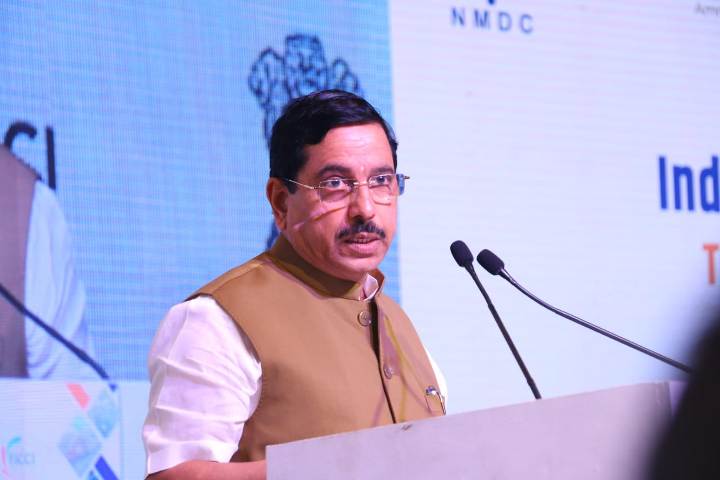Pralhad Joshi Chairs BIS Council Meet, Sets Vision for Quality Standards in India
The Minister said these QCOs reflect India’s assertive posture in quality assurance and regulatory excellence and contribute to import substitution and global competitiveness.

- Country:
- India
In a pivotal meeting aimed at strengthening India’s quality infrastructure and standardization ecosystem, Union Minister for Consumer Affairs, Food and Public Distribution and New & Renewable Energy, Shri Pralhad Joshi, presided over the 9th Governing Council Meeting of the Bureau of Indian Standards (BIS) in New Delhi. As the ex-officio President of the BIS Governing Council, the Minister charted out a progressive roadmap for enhancing national and global trust in Indian standards, certification systems, and conformity assessment.
The meeting brought together ministers from five states—Andhra Pradesh, Uttarakhand, Bihar, Gujarat, and Assam—as well as top officials from the Department of Consumer Affairs and BIS, including Smt. Nidhi Khare, Secretary, Department of Consumer Affairs, who reviewed the key achievements and strategic direction of BIS for 2025-26.
Strengthening India’s Standardization and Quality Infrastructure
In his address, Shri Joshi lauded the BIS for achieving a significant milestone in bringing 371 districts under the mandatory hallmarking regime for gold jewellery, a move that enhances consumer protection and ensures uniformity in quality. He directed BIS to expand hallmarking coverage to more districts in the coming year to maximize outreach and consumer confidence.
The Minister emphasized that Indian standards serve as the bedrock for national quality infrastructure, stating that BIS has successfully formulated 23,798 Indian Standards across sectors, including manufacturing, services, food safety, electronics, textiles, and construction.
Growth in QCOs: A Leap Towards Consumer Safety
BIS's support to other ministries in the development of Quality Control Orders (QCOs) was particularly noted. Since 2014, the number of QCOs has grown from 14 to 191, now covering 774 specific products and 2 horizontal QCOs. These regulatory instruments are critical in ensuring product safety, environmental protection, and consumer well-being.
The Minister said these QCOs reflect India’s assertive posture in quality assurance and regulatory excellence and contribute to import substitution and global competitiveness.
From Regulator to Facilitator: A Vision for BIS
Shri Joshi stressed that while BIS is a statutory regulator, it must transform into a facilitator for India’s industries, particularly startups, MSMEs, and rural enterprises. Encouraging voluntary adoption of BIS standards and marks, he urged BIS to focus on:
-
Raising awareness among industry stakeholders
-
Handholding MSMEs for compliance
-
Addressing operational challenges through outreach programmes
He specifically praised initiatives like Manak Manthan and Manak Samvaad, organized by BIS field offices, for fostering grassroots-level engagement with industry players.
Enhancing Lab Capacity and Ensuring Transparency
Acknowledging BIS’s role in testing and certification, the Minister appreciated the processing of over 2.5 lakh product samples in FY 2024–25. He emphasized the need for:
-
Increased transparency in test reporting
-
Accelerated turnaround for certification
-
Zero tolerance for malpractice in testing protocols
He approved funding proposals worth ₹78 crore aimed at bolstering testing capabilities in emerging sectors, including:
-
Aerospace components
-
Solar photovoltaic modules
-
Organic food
-
High-voltage electrical equipment
BIS Annual Programme and Laboratory Modernization
BIS presented its Annual Programme on Standardization (APS) 2025–26, developed with inputs from 40 central ministries and 84 industry associations. The APS will focus on:
-
Bridging sectoral gaps in standards
-
Aligning Indian standards with national developmental priorities
-
Improving ease of doing business through regulatory simplification
In parallel, BIS unveiled a Laboratory Modernization Plan to digitize, automate, and upgrade testing infrastructure. Critical goals include:
-
Developing comprehensive test facilities for strategic sectors
-
Upgrading laboratories with AI-enabled testing tools
-
Enhancing interoperability of lab networks for seamless conformity assessment
Hosting the 89th IEC General Meeting in New Delhi
In a major international milestone, BIS announced that India will host the 89th International Electrotechnical Commission (IEC) General Meeting from September 8 to 19, 2025, in New Delhi. The event is expected to bring together over 1,500 participants from 150+ countries, and will feature:
-
Management and Technical Committee meetings
-
Workshops on global standardization trends
-
An international exhibition of conformity assessment technologies
Shri Joshi expressed that this global event will position India as a key player in international standard-setting, particularly in the domain of smart grids, e-mobility, sustainable electronics, and energy-efficient systems.
A Call for Zero Compromise on Quality
Underscoring the motto of “Quality First”, the Union Minister called for a zero-tolerance approach to substandard products and regulatory violations. He urged BIS to:
-
Expand its surveillance network
-
Tighten post-market inspection regimes
-
Support local manufacturers with testing assistance and training
He concluded by stating that quality standards are integral to the dream of Viksit Bharat @ 2047, and BIS’s role will be crucial in establishing India as a global quality leader.
BIS as a Catalyst for India’s Growth
The 9th Governing Council Meeting of BIS marked a defining step in India’s pursuit of a robust, inclusive, and future-ready quality ecosystem. Through strong regulatory backing, stakeholder collaboration, and infrastructure modernization, BIS is poised to become not just a standards body, but a national enabler of innovation, safety, and global competitiveness.










